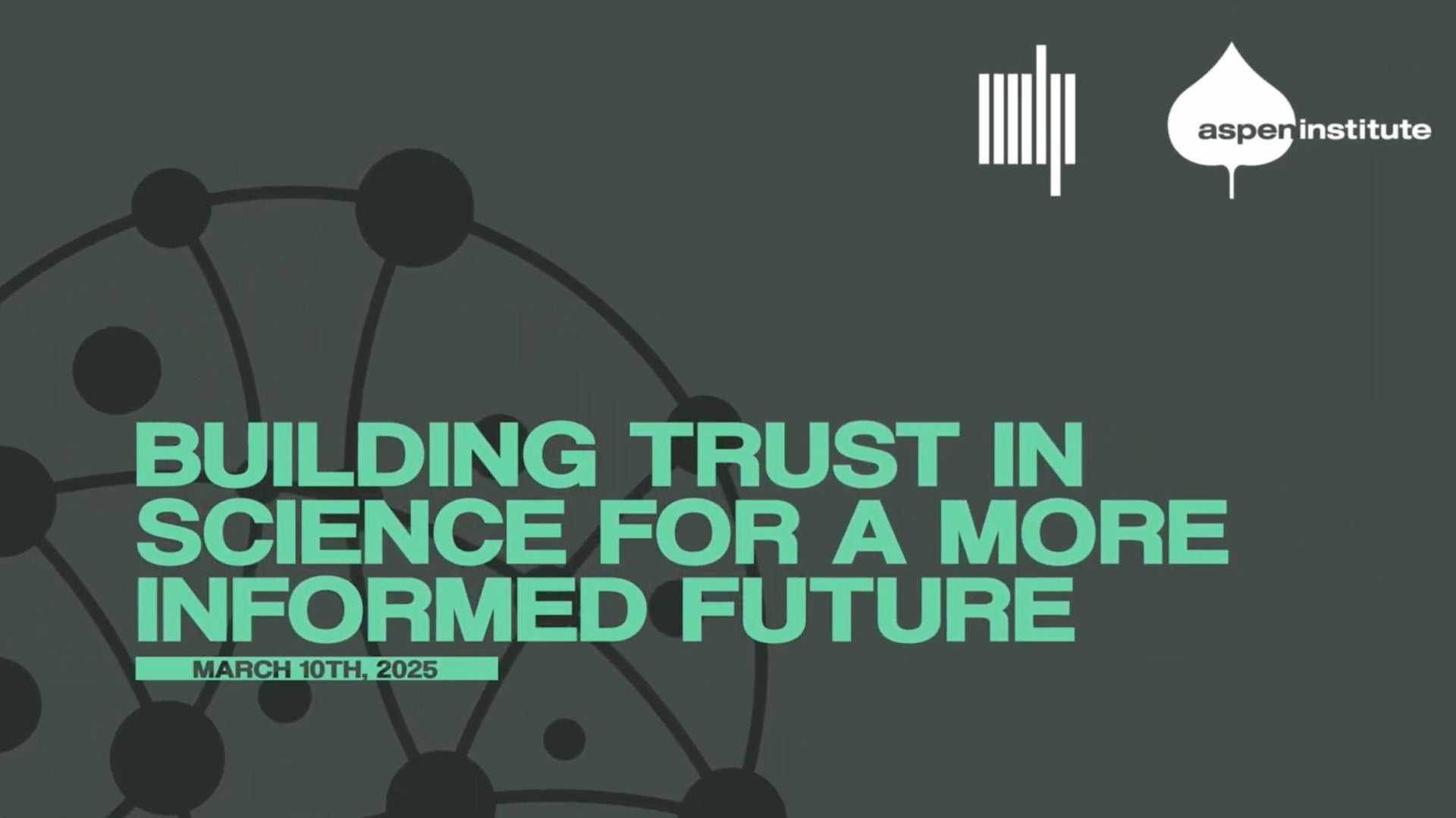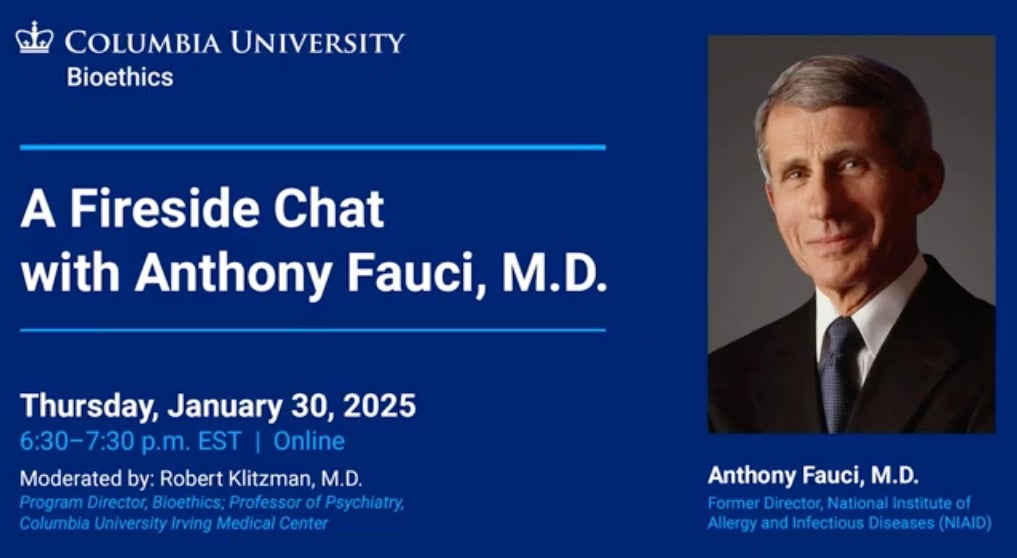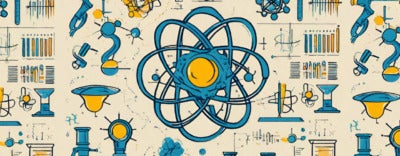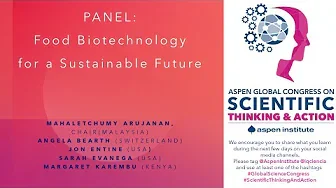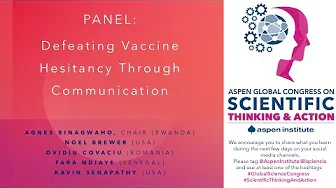Event Recordings
Back to the Science & Society Program
2025
Building Trust for a More Informed Future (March 2025)
This collaboration between the Aspen Institute Science & Society Program and the MIT Press aims to bridge the gap between the evidence-base on how humans process and understand information, and the vulnerabilities to misinformation and propaganda we endure when we fail to leverage this knowledge in communicating science, especially in the age of generative AI. Attendees included science communicators, journalists, researchers, students, and policymakers from around the globe.
- MIT Provost Cindy Barnhart
- MIT Institute Professor Robert Langer
Keynote Address: Communication Science for Social Impact in Today’s World
- Francis Collins (Former Director of the National Institutes of Health)
- Lina Yassin (Sudanese climate journalist and development consultant); moderated by Alfred Ironside (VP for Communications, MIT)
When Two Tribes Go to War: Polarization and Science Communication
Abstract: Why do groups become polarized around some scientific topics (climate change, vaccines, GMOs) but not around others (astrophysics, fluid dynamics)? What can science communication practice learn from social psychology and behavioral sciences in relation to the processes of group polarization? What communications strategies can address or mitigate against polarization? Our panelists will explore the nature of group polarization, its implications for science communication strategies, and its relationship with motivated reasoning, identity and trust.
- Lee McIntyre, Research Fellow at the Center for Philosophy and History of Science at Boston University and a Senior Advisor for Public Trust in Science at the Aspen Institute
- Dietram Scheufele, Taylor-Bascom Chair in Science Communication,University of Wisconsin Madison
- Lily Tsai, Ford Professor of Political Science, Director, MIT Governance Lab
- Moderated by Michael John Gorman, Director of the MIT Museum, and Professor of the Practice of Science, Technology, and Society
Arts Interlude: Climate Comedy
- Stuart Goldsmith, Climate Comedian
- Including a conversation with Jason Jay, Director of the Sustainability Initiative at MIT Sloan
Climate Communication After the Age of Denial
Abstract: As a large majority of the public has come to accept the reality of climate change, the frontiers of climate communication have moved on to the pressing questions of how we will respond, and how fast. But what do we really know about how communicators can best inform and influence behavior change around climate issues? This panel will dig into the state of knowledge on how audiences receive different types of climate messaging, which behaviors communicators can impact and how, and how non-traditional science communication in entertainment, news and popular and social media offer unique opportunities to influence public opinion and action.
- Lauren Feldman, Professor of Journalism and Media Studies, Rutgers School of Communication and Information
- Bernadette Woods Placky, Chief Meteorologist and Director of Climate Matters, Climate Central
- Anirudh Tiwathia, Director of Behavioral Science, Rare Center for Behavior & the Environment
- Madalina Vlasceanu, Assistant Professor of Environmental Behavioral Sciences, Stanford, and Director of the Stanford Climate Cognition Lab
- Moderated by Deborah Blum, Executive Director, Knight Science Journalism program
The Power of Public Health Storytelling for Societal Transformation
Abstract: This session will explore how storytelling can be a powerful driver of societal change and a tool for rebuilding trust in public health. Strengthening trust is crucial, as it can significantly impact how communities respond to and recover from public health crises. Through real-world case studies and expert insights, participants will discover how narratives can bridge the gap between complex health information and the lived experiences of diverse communities. Grounded in evidence and theory, this session will highlight storytelling strategies that resonate emotionally and culturally, fostering understanding, driving behavior change, and improving public health outcomes. Participants will leave empowered to craft stories that inspire action and contribute to equitable solutions.
- Lori Rose Benson, Former CEO, Hip Hop Public Health; Principal, Sanus Advisors
- Melissa Fleming, Under-Secretary-General for Global Communications, UN Department of Global Communications
- Laura Hughes, Principal & Founder of Gusto Partners, LLC; former Director of Narrative Strategies, PolicyLink
- Erica Rosenthal, Director of Research, USC Annenberg Norman Lear Center
- Co-moderated by Amml Hussein, Civic Science Fellow, Boston University; President-elect, National Association of Social Workers (NASW), New Jersey chapter
- Co-moderated by Jylana L. Sheats, Associate Professor, Tulane University School of Public Health; Associate Director, Aspen Institute Science & Society Program
Abstract: It’s early days, but one thing is clear – Generative AI is disrupting a number of industries including media, education, research and medicine. On one hand, it is supercharging the production of disinformation and propaganda, it’s automating workflows and creative processes putting a large number of careers in jeopardy. But it’s also offering exciting opportunities for investigative journalism, translation and synthesis, and more empathetic communication. This expert panel will take a broad look at how AI tools are shaping our trust in the media we consume and what that means for rebuilding trust in our society.
- Renee Cummings, Professor of Practice in Data Science at the University of Virginia, 2023 VentureBeat AI Innovator Award winner, and the first Data Activist-in-Residence at the UVA School of Data Science
- David Rand, Erwin H. Schell Professor and Professor of Management Science and Brain and Cognitive Sciences at MIT, the director of the Applied Cooperation Initiative
- Claire Wardle, Associate Professor, Department of Communication at Cornell University
- Moderated by Mariette DiChristina, Dean of the Boston University College of Communication
Key Takeaways: Directions for Future Research and Action
Abstract: Rick Berke in conversation with Kai Kupferschmidt. Kai, who has reported on infectious diseases for 15 years, devoted a year as an MIT Knight Science Journalism Fellow studying misinformation, and Rick will talk with him about what he learned in that deep dive, his takeaways from the conference, and a look to the future.
- Rick Berke, co-founder and executive editor of STAT
- Kai Kupferschmidt, contributing correspondent for Science magazine
Shaping a Sustainable Future: Climate Justice, Policy, and Diplomacy in Action (January 2025)
2024
 Empowering Change Through Civic Science: Understanding Engagement, Policy, and Fairness (December 2024)
Empowering Change Through Civic Science: Understanding Engagement, Policy, and Fairness (December 2024)
Taking Stock of Election 2024: Challenges and Opportunities for Science (November 2024)
 Breaking the Wall to Climate Justice Through STEM Mentorship (November 2024)
Breaking the Wall to Climate Justice Through STEM Mentorship (November 2024)
The Future of Science and Healthcare: Policy, Public Opinion, and Pressing Needs (October 2024)
 Science and Justice: Past, Present, and Future (October 2024)
Science and Justice: Past, Present, and Future (October 2024)
Open Science and the Case Study of War-Torn Ukraine (October 2024)
Navigating the Infodemic: Science in Post-Truth Ukraine (September 2024)
OFIS X The Truth Initiative: Social Media as a Tool for Activism (April 2024)
 Unpacking the Science of Infectious Disease & Public Health Disparities (March 2024)
Unpacking the Science of Infectious Disease & Public Health Disparities (March 2024)
 Criminal Justice, AI, & Bias (February 2024)
Criminal Justice, AI, & Bias (February 2024)
 Urban Agriculture and Implications for Climate Resiliency (January 2024)
Urban Agriculture and Implications for Climate Resiliency (January 2024)
2023
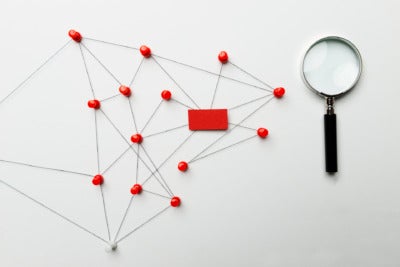 Is Rational Belief in Improbable Theories Ever Warranted? (December 2023)
Is Rational Belief in Improbable Theories Ever Warranted? (December 2023)
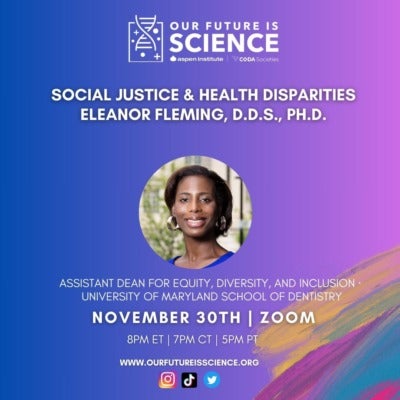 Health Disparities & Health Equity & Social Justice (November 2023)
Health Disparities & Health Equity & Social Justice (November 2023)
 The Blueprint: Engineering for the People (November 2023)
The Blueprint: Engineering for the People (November 2023)
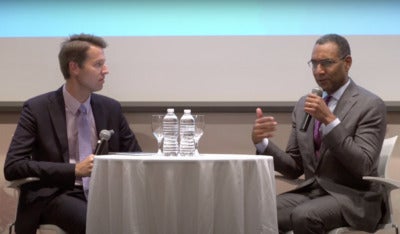 The Story of Us: The American Museum of Natural History’s Vision for the Future of Science & Society (October 2023)
The Story of Us: The American Museum of Natural History’s Vision for the Future of Science & Society (October 2023)
 AI For All? An Exploration of Real-World Algorithmic Bias (April 2023)
AI For All? An Exploration of Real-World Algorithmic Bias (April 2023)
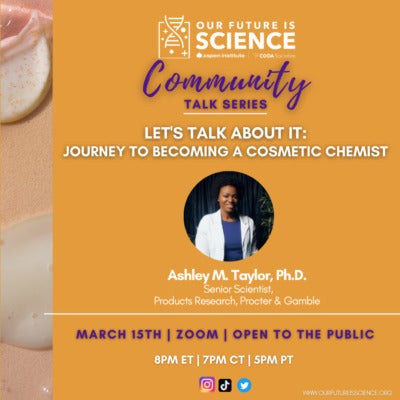 Let’s Talk about It: Journey to Becoming a Cosmetic Chemist (March 2023)
Let’s Talk about It: Journey to Becoming a Cosmetic Chemist (March 2023)
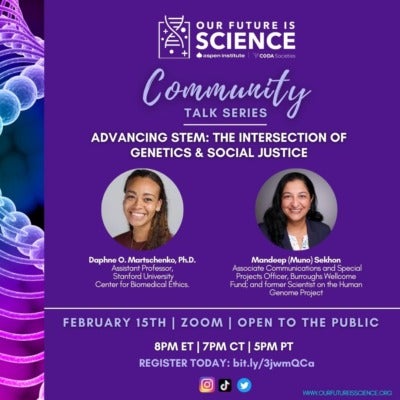 Advancing STEM: The Intersection of Genetics & Social Justice (February 2023)
Advancing STEM: The Intersection of Genetics & Social Justice (February 2023)
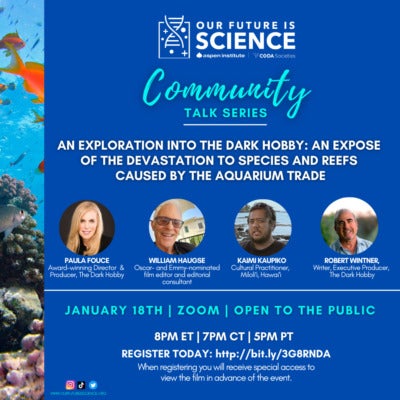 An Exploration into The Dark Hobby: An expose of the devastation to species and reefs caused by the aquarium trade (January 2023)
An Exploration into The Dark Hobby: An expose of the devastation to species and reefs caused by the aquarium trade (January 2023)
2022
 Advancing Equity & Social Justice: A Fireside Chat with Dr. Uché Blackstock (December 2022)
Advancing Equity & Social Justice: A Fireside Chat with Dr. Uché Blackstock (December 2022)
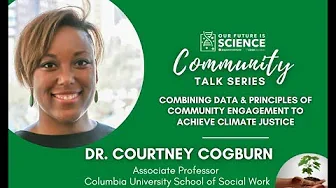 Combining Data & Principles of Community Engagement to Achieve Climate Justice (December 2022)
Combining Data & Principles of Community Engagement to Achieve Climate Justice (December 2022)
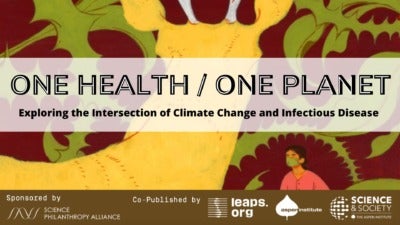 One Health / One Planet – Symposium (June 2022)
One Health / One Planet – Symposium (June 2022)
 Big Data, Tech, & Social Justice (April 2022)
Big Data, Tech, & Social Justice (April 2022)
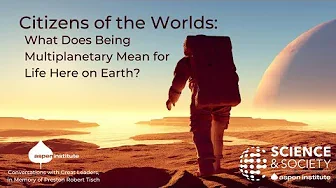 Citizens of the Worlds: What Does Being Multiplanetary Mean for Life Here on Earth? (March 2022)
Citizens of the Worlds: What Does Being Multiplanetary Mean for Life Here on Earth? (March 2022)
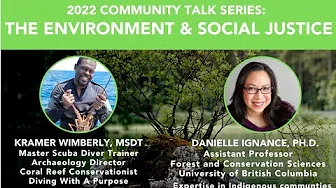 The Environment and Social Justice (March 2022)
The Environment and Social Justice (March 2022)
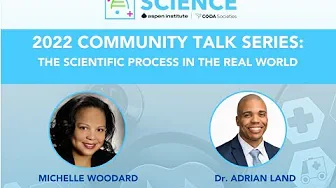 The Scientific Process in the Real World (February 2022)
The Scientific Process in the Real World (February 2022)
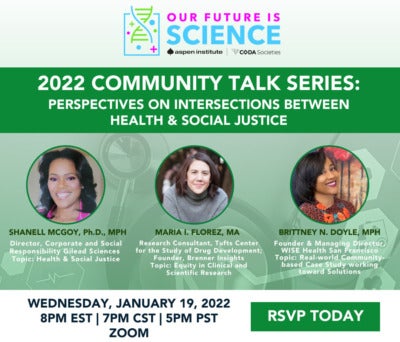 Perspectives on Intersections Between Health & Social Justice (January 2022)
Perspectives on Intersections Between Health & Social Justice (January 2022)
2021
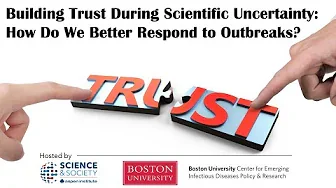 Building Trust During Scientific Uncertainty: How Do We Better Respond to Outbreaks? (December 2021)
Building Trust During Scientific Uncertainty: How Do We Better Respond to Outbreaks? (December 2021)
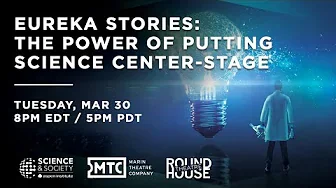 Eureka Stories: The Power of Putting Science Center-Stage (March 2021)
Eureka Stories: The Power of Putting Science Center-Stage (March 2021)
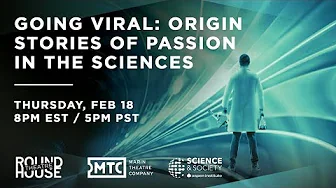 Going Viral: Origin Stories of Passion in the Sciences (February 2021)
Going Viral: Origin Stories of Passion in the Sciences (February 2021)
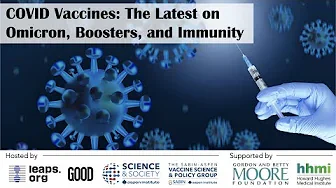 COVID Vaccines: The Latest on Omicron, Boosters, and Immunity (December 2021)
COVID Vaccines: The Latest on Omicron, Boosters, and Immunity (December 2021)
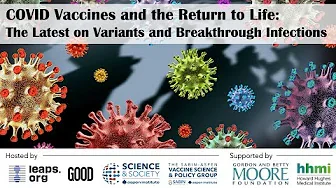 COVID Vaccines: The Latest on Variants and Breakthrough Infections (September 2021)
COVID Vaccines: The Latest on Variants and Breakthrough Infections (September 2021)
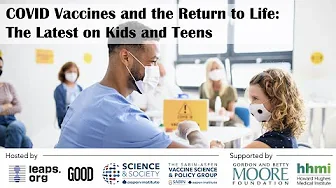 COVID Vaccines and the Return to Life: The Latest on Kids and Teens (May 2021)
COVID Vaccines and the Return to Life: The Latest on Kids and Teens (May 2021)
Food Biotechnology for a Sustainable Future (March 2021)
Defeating Vaccine Hesitancy Through Communication (March 2021)
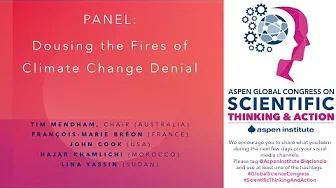 Dousing the Fires of Climate Change Denial (March 2021)
Dousing the Fires of Climate Change Denial (March 2021)
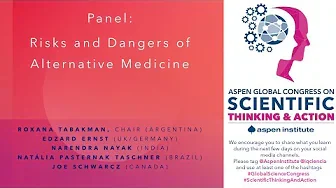 Risks and Dangers of Alternative Medicine (March 2021)
Risks and Dangers of Alternative Medicine (March 2021)
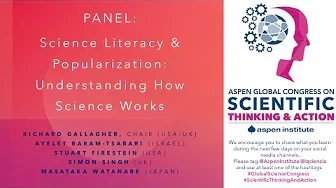 Science Literacy & Popularization: Understanding How Science Works (March 2021)
Science Literacy & Popularization: Understanding How Science Works (March 2021)
 Building a Dialogue on Evidence & Values: Overcoming Science Denialism (March 2021)
Building a Dialogue on Evidence & Values: Overcoming Science Denialism (March 2021)
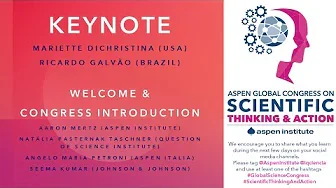 Keynote: Standing Up for Data and Evidence in the Face of Science Denial (March 2021)
Keynote: Standing Up for Data and Evidence in the Face of Science Denial (March 2021)
2020
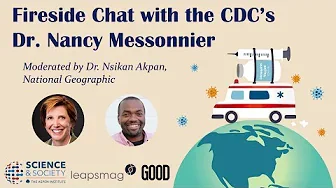 Fireside Chat with the CDC’s Dr. Nancy Messonnier (December 2020)
Fireside Chat with the CDC’s Dr. Nancy Messonnier (December 2020)
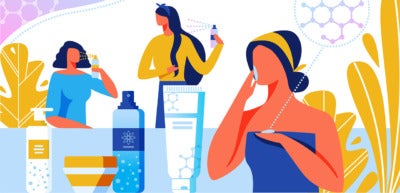 The Chemistry of Beauty: The Lore and the Science (November 2020)
The Chemistry of Beauty: The Lore and the Science (November 2020)
 Future of Science in America Summit (November 2020)
Future of Science in America Summit (November 2020)
 The Pandemic Science Summit (June 2020)
The Pandemic Science Summit (June 2020)
 Confronting Climate Change: Science and Activism to the Rescue (February 2020)
Confronting Climate Change: Science and Activism to the Rescue (February 2020)
2019
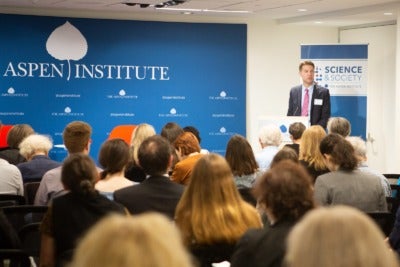 Book Talk with Michael Lubell and Science & Society Program Launch (May 2019)
Book Talk with Michael Lubell and Science & Society Program Launch (May 2019)
Back to the Science & Society Program
